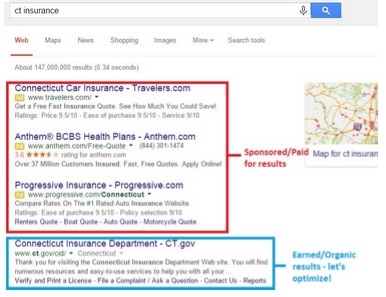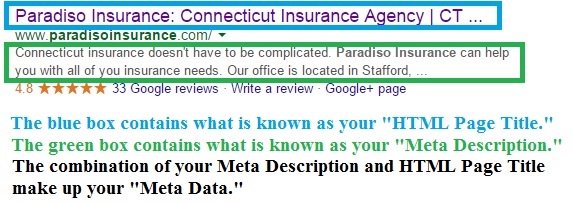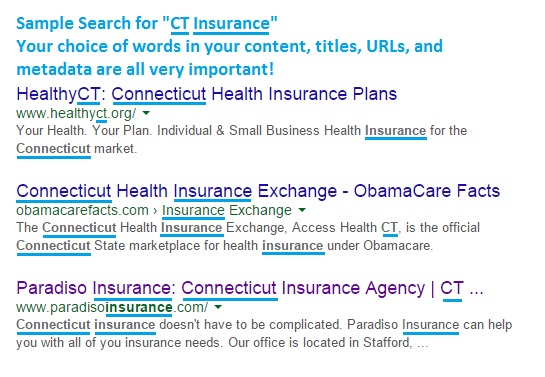Search Engine Optimization, or SEO for short, is something that more insurance agencies are tapping into, so they can get more visibility on the internet. What exactly is SEO, you might ask? SEO refers process of optimizing a website for maximum search engine exposure. Generally speaking, when you perform a sea rch on a search engine such as Google, the first results that come up are paid advertisements, or sponsored results. Each time a user clicks on one of those results, the advertiser is charged a fee. This advertising model is called Pay Per Click. After that, you’ll see the “organic” results. Websites listed in these results have “earned” their place – they didn’t pay for it – at least not in the traditional sense.. Based on our own experiences, pushing your company to the top of search engine’s results will give you a stronger presence on the web, better brand name recognition, and at the end of the day, more sales. So let’s talk about optimization, and how you can begin to increase your website’s exposure.
rch on a search engine such as Google, the first results that come up are paid advertisements, or sponsored results. Each time a user clicks on one of those results, the advertiser is charged a fee. This advertising model is called Pay Per Click. After that, you’ll see the “organic” results. Websites listed in these results have “earned” their place – they didn’t pay for it – at least not in the traditional sense.. Based on our own experiences, pushing your company to the top of search engine’s results will give you a stronger presence on the web, better brand name recognition, and at the end of the day, more sales. So let’s talk about optimization, and how you can begin to increase your website’s exposure.
I want the top!
If you’re anything like us, then when someone searches for your industry, service, or brand, you want to be at the very top of the list of results. It may sound next to impossible, but it’s not. It’s not easy, though. It requires diligence and ongoing maintenance. Let’s go over a few basic methods you can use to help your company start climbing the ranks.
First of all, your choice of words is important. Search engines account for almost every word on the internet, and will filter out results to include only the pages that have the words you searched for. So try to word your websites in a way that will connect with your audience.. Also include key phrases or words in your metadata, which is a combination of the HTML Page Title and the Meta Description.
Next, your URL structure is very important. The first thing you want to take note of is that your word choice within your website’s URLs are important to optimizing your search results. If the words that are searched for appear in your websites URL, they will have a stronger yield overall. Be selective in your choice of words for your website’s URLs, and use words that you feel your customers would search for to find your company.
Also, it’s important that if you are working on multiple avenues, such as Facebook, Twitter, and Linkedin, you should have links that connect your networks together on each page. So on your Linkedin, include links to your Facebook and Twitter pages, and vice versa, to keep all of your pages connected.
Another key point that search engines look out for is a website’s reputation. What do we mean by reputation? When a website gets regularly updated with interesting, engaging, and relevant content, and also has links and keywords in the context to back it up, a search engine will take notice. The search engine sees up-to-date and active content as more relevant to the results, and will push it closer to the top of the list if you’re consistent with your updates. Simply having engaging content isn’t everything though; you need to be sure to market your content in whatever ways you can, so that it gets both visibility and recognition within your network. The more exposure, the better, so tack on some extra views for your content whenever you see an opportunity to.
A Few Things to Avoid
So now that you have the basics down, let’s talk about a few things that you may want to avoid that could potentially hinder your search optimization. One thing you need to look out for is the use of uncommon terms. As an example, you wouldn’t normally say “portable cellular device” instead of simply saying “cellphone.” Speak to your audience in a way that they want to be spoken to, so that they have an easier time finding your pages. Also, try to be sure that you don’t go out of your geographical context. What we mean by this is, you wouldn’t want to write an article about maintenance on Italian vehicles if most of your website traffic is coming from China. You can use common sense and reason to determine your target geography and audience. Lastly, try not to have mix-matched context and content when making updates to your site or page. You wouldn’t want to have an article that is entitled “How to Salsa Dance” and then write an article on the best salsas to choose for making tacos. This one is pretty self explainable; just keep it simple and straightforward for the most part.
How can I take it one Step Further?
There’s a lot that goes into search engine optimization, and we’ve only just scratched the surface with the subjects we talked about so far. These basics can be considered as fundamentals and guidelines moving forward, but there is much more you can do to get to the very top of the results, and sweep past your competition. If you’re looking for more advanced methodologies, and a full understanding of SEO, one suggestion we have is to take a look at Google’s publication on SEO, located here:
Google is the #1 search engine in usage right now on the web, so following their guidelines for SEO is a sure-fire way to boost your visibility on the web. Remember, SEO is important, because even though social media can generate traffic to your websites, search engines are still the leading source for getting more website hits overall. More hits mean more business, and more business means more revenue and a stronger presence in your market. So get optimized!





